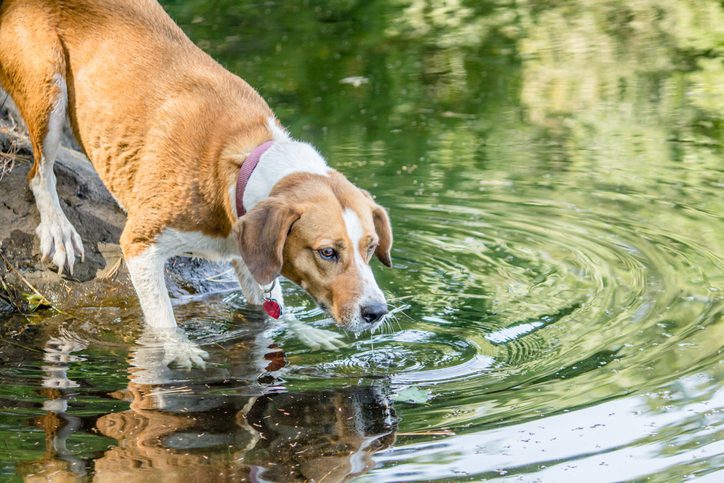What You Need to Know About Leptospirosis in Dogs in Dunedin, FL
Leptospirosis is a disease caused by infection with the Leptospira bacteria, which can be found worldwide in soil and water (particularly stagnant or slow-moving water like puddles, ponds, or lakes)—although it’s more common in areas with warm climates and high annual rainfalls. The bacteria can survive for weeks to months.
This disease is zoonotic, which means that it can spread from animals to people. So, it is possible for people to become infected after contact with an affected pet, but it’s not super common.

Find out more about the signs and treatment of lepto in dogs by reading our Dunedin, FL, animal hospital‘s article below.
Risk Factors
Dogs that drink from rivers, lakes, or streams and roam on rural properties (due to exposure to infected wildlife [most likely rodents and raccoons], farm animals [most likely livestock], etc.) are at an increased risk of being infected with leptospirosis.
Furthermore, dogs can become infected in their mucous membranes or skin with an open wound/cut if they come into contact with infected urine, urine-contaminated soil, water, food, or bedding, through a bite from an infected animal, by eating tissues or carcasses, and (although rarely), breeding. The disease can also be passed through the placenta from a mother dog to puppies.
Signs and Symptoms
The incubation period, or the time between an exposure to the bacteria and the appearance of symptoms, is usually around one week.
There are several symptoms that arise in an infected dog. They include:
- Fever
- Shivering
- Muscle tenderness
- Reluctance to move
- Decreased appetite
- Vomiting
- Increased thirst and urination
- Lethargy or weakness
- Jaundice (yellowing of the skin and mucous membranes)
- Painful inflammation within the eyes
- Diarrhea
Leptospirosis can also cause kidney failure, severe lung disease, bleeding disorders (which can lead to blood-tinged vomit, urine, stool, or saliva, nosebleeds, and red pinpoint spots visible on the gums and other mucus membranes or light-colored skin), and swollen legs or abdomen due to exclusively accumulated fluid.
However, these signs can also be indicative of other diseases, so a dog suspected of leptospirosis should be brought to a licensed vet for a professional diagnosis.
Diagnosis
Your veterinarian will likely recommend blood work and urine testing if you suspect your dog has leptospirosis. Then, based on those results, additional testing is needed such as a polymerase chain reaction (PCR) test (which looks for DNA of the Leptospira organism) and testing for antibodies. Chest X-rays may also be needed to rule out pulmonary hemorrhage.
Treatment
Leptospirosis is usually treated with antibiotics (like IV penicillin derivatives or oral doxycycline) and other supportive care. Because clinical signs in dogs who were prescribed antibiotics often include vomiting or decreased appetite, therapy (at least initially) may need to be administered parenterally (inside the body right outside the intestine) rather than orally.
Hospitalization with IV fluids and management of electrolytes are also often necessary. Other methods such as dialysis and hydration therapy can be utilized.
Early detection and aggressive treatment are key in improving the chances of recovery. However, there will still be a risk of kidney or liver damage. But the damage to those organs will be less the sooner you get your dog seen and start treatment.
Prevention
For Your Dog
Other than keeping your dog away from water and other areas as mentioned above, vaccines are available that can help protect dogs against the four most common strains (grippotyphosa, canicola, icterohaemorrhagiae, and Pomona). After a dog’s first vaccination, a booster will be needed in three to four weeks. Then, dogs should receive annual boosters.
For You (If Your Dog is Infected)
As mentioned before, even though an infected dog presents a low risk at spreading the infection to you and your family members, there’s always still a chance. So, if your dog is diagnosed with leptospirosis, you should take the following precautions:
- Administer antibiotics to your dog as prescribed by your veterinarian;
- Avoid contact with your dog’s urine;
- Quickly clean accidents in your home with a disinfectant while wearing gloves;
- Encourage your dog to urinate away from standing water or areas where people or animals have regular access to; and
- Wash your hands after handling your pet.
If you are pregnant or immunocompromised (due to medications, cancer treatment, or other illnesses), you may want to consult your physician for advice.
Our Dunedin, FL, Vets Can Help with Your Dog’s Lepto
Leptospirosis can be dangerous and life-threatening. But dogs that are promptly seen by a vet and started on a treatment plan have the best change of survival and less damage of vital organs.
Preventing your dog from accessing water (mainly stagnant and slow-moving) that other animals could also have access to and keeping up with annual vaccinations will help keep your furry friend safe. And although your chances of catching Leptospirosis from an infected dog, you should still implement certain safety precautions to keep you and your family safe if your pet is diagnosed with the disease.
Our Dunedin, FL, veterinarians can diagnose and treat your dog’s lepto. If you believe your dog has leptospirosis, reach out to our animal hospital by calling (727) 953-6588.
